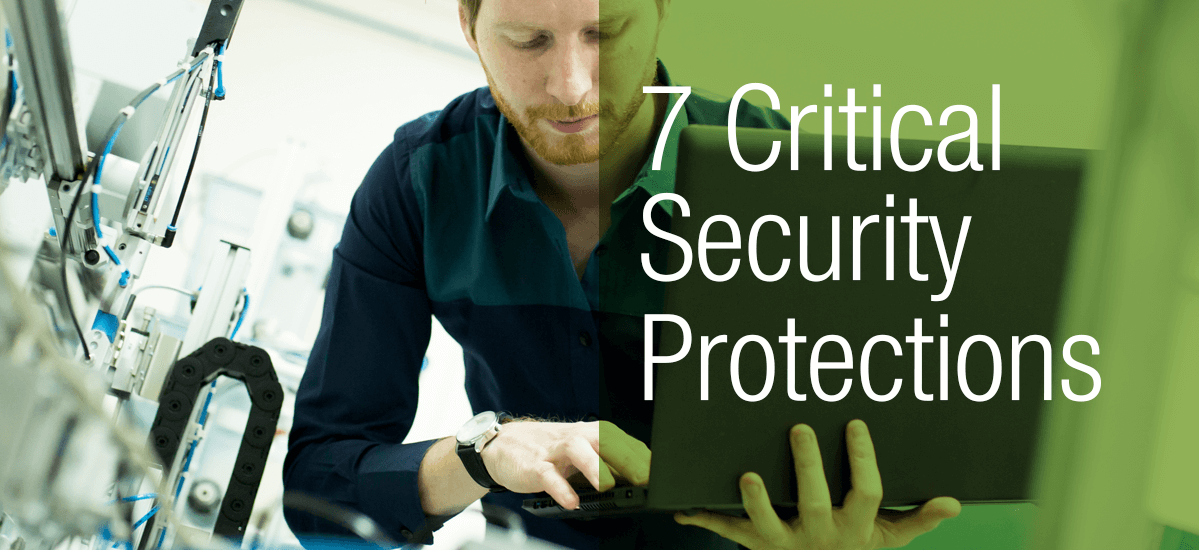What are you doing to protect your business data?
Cybercrime is at an all-time high, and hackers are setting their sights on small and medium-sized businesses. As more businesses utilize cloud computing and mobile devices and store more information online, more businesses are putting themselves at risk.
Consider how many times a day you enter usernames and passwords to log into accounts on your computer, laptop, cell phone, tablet – the list goes on. Do you ever think about the security of keeping these accounts safe? What are you doing to keep yourself and your business safe from hacker attacks?
If you are a small to mid-sized company, you are being targeted by hackers from all around the world. What can you do today to begin making your online security a priority for your organization?
To help you get started in protecting your business, your employees, and your customers from cybercrime, we’ve outlined 7 IT and network security measures to consider.
Here are 7 cyber security measures to practice as you continue to grow your business:
1. Educate Yourself and Your Employees
Almost all security breaches in business are due to an employee clicking, downloading, or opening a file that’s infected, either on a website or in an email; once a hacker gains entry, they use that person’s email and/or access to infect all the other PCs on the network.
Phishing emails (emails cleverly designed to look like legitimate messages from a website or vendor you trust) are still a very common occurrence – and spam filtering and anti-virus cannot protect your network if an employee is clicking on and downloading the virus.
2. Require Strong Passwords
Keep your network and data safe with a secure password. Passwords should be at least 8 characters and contain lowercase and uppercase letters, symbols, and at least one number. On a cell phone, requiring a passcode to be entered will go a long way toward preventing a stolen device from being compromised.
3. Keep Your Network and Devices Up-to-Date
New vulnerabilities are frequently found in common software programs you are using, such as Adobe, Flash, or QuickTime; therefore it’s critical you update your systems and applications when one becomes available. If you’re under a managed IT plan, this can all be automated for you so you don’t have to worry about missing an important update.
4. Have an In-Place Backup
A good, automated, and monitored backup will protect you against an employee deleting or overwriting files, natural disasters, fire, water damage, hardware failures, and a host of other data-erasing disasters. Prepare your network for an unexpected disaster with this disaster recovery checklist.
5. Monitor Personal Devices
The use of personal and mobile devices in the workplace is increasingly popular, and, thanks to the convenience of cloud computing, you and your employees can gain access to pretty much any type of company data remotely; all it takes is a known username and password.
Your biggest danger with cloud computing is that one of your employees accesses a critical cloud application via a personal device that is infected, thereby giving a hacker access to your data and cloud application. To help protect against hackers, encourage using company-owned and monitored devices, and never allow employees to access work-related files, cloud applications, and e-mail on personal devices or public WiFi.
6. Invest in a Good Firewall
A firewall acts as the front-line defense against hackers, blocking everything you haven’t specifically allowed to enter (or leave) your computer network. All firewalls need regular monitoring and maintenance, just like all devices on your network or they are completely useless. This too should be done by your IT person or company as part of their regular, routine maintenance.
7. Protect your Bank Account
Your company’s bank account doesn’t enjoy the same protections as a personal bank account – meaning you are more liable for the protection of it. If a hacker takes money from your business account, the bank is not responsible for getting your money back. Make sure you are regularly monitoring your accounts and have a trustworthy source of protection.
Do you have cybercrime security?


